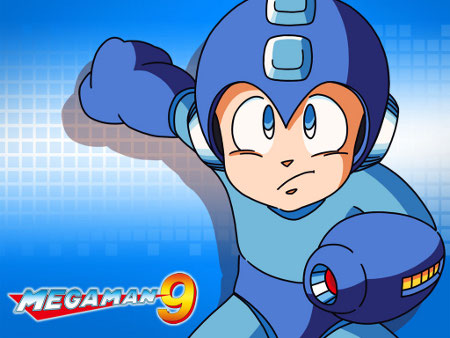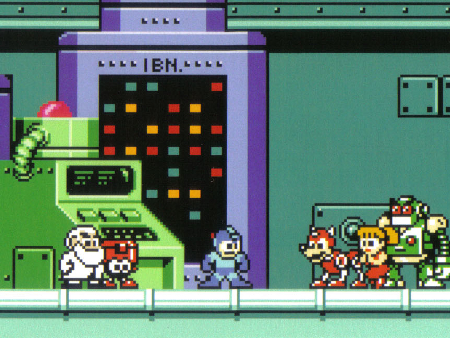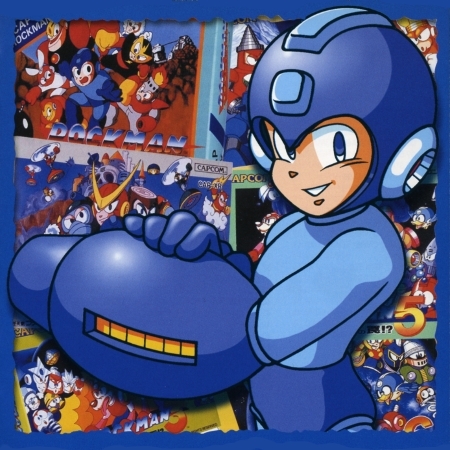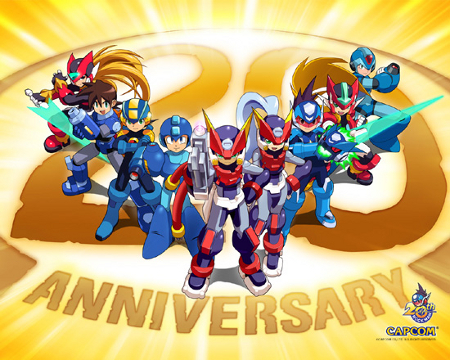Mega Man 1 & 2 Sound Team Interview: Reunited 20 Years On
The NES’ Mega Man and Mega Man 2 might have been released over 20 years ago, but the games are still very popular in the fan community to this day. Despite massive technological limitations, their scores are regarded as definitive examples of chiptune music and have endeared listeners with their memorable melodies, infectious rhythms, and upbeat tones. Reflecting their quality and influence, they have tributed in numerous albums and concerts, and have provided an inspiration for subsequent scores in the franchise.
The scores for the games were handled by three people, originally listed as pseudonyms in the game credits. Manami Matsumae (aka Chanchacorin) composed all the music for the original Mega Man, Takashi Tateishi (aka Ogeretsu Kun) composed the legendary Mega Man 2 score, and Yoshihiro Sakaguchi (aka Yuukichan’s Papa) served as a sound manager and sound driver programmer. In an incredible meeting, Game Music Net, with the kind help of Ippo Yamada and Akari Kaida, reunited all three musicians after 20 years apart to recollect their experiences on Mega Man and Mega Man 2 all these years on.
All three musicians went on to have very successful careers after leaving Capcom in the early 1990s: Manami Matsumae has continued to work in the games industry on the Derby Stallion and Dragon Quest series, Takashi Tateishi is a music producer for two major pop artists, and Yoshihiro Sakaguchi has worked as a sound editor on several well-known anime franchises. In subsequent parts of this interview, Game Music Online talks individually to each of their artists about their experiences after the Blue Bomber.
Interview Credits
Interview Subject: Takashi Tateishi, Manami Matsumae, Yoshihiro Sakaguchi
Interviewer: Chris Greening
Editor: Chris Greening
Translation & Localisation: Ben Schweitzer, Christopher Ling, Shota Nakama
Coordination: Ippo Yamada, Akari Kaida
Support: Don Kotowski, John Niver
Interview Content
Chris: Takashi Tateishi, Manami Matsumae, and Yoshihiro Sakaguchi, we really appreciate you taking the time to talk to us today, with the help of Ippo Yamada and Akari Kaida. How does it feel to be reunited to talk about Mega Man and Mega Man 2 all these years later?
Takashi Tateishi: It’s been a long time, everyone. Actually, I still contact Matsumae-san from time to time.
Manami Matsumae: It’s been a while! I’ve been having secret meetings with Tateishi (laughs), but I haven’t seen Sakaguchi since I left Capcom. It’s been 20 years! How are you doing?
Yoshihiro Sakaguchi: Yes, it sure has been a while. I left the game industry, and I haven’t had many opportunities to meet with everybody, so I was looking forward to today.
Takashi Tateishi: I happened to meet Sakaguchi two years ago in a studio in Tokyo. When we saw each other, we were both surprised and said “Why are you here? Are you still in this business?”
Yoshihiro Sakaguchi: Hahaha, I was really surprised then. Tateishi was there through some connections, and I happened to be working there. The world is really quite small, I thought.
Takashi Tateishi: Our connection to the Mega Man series is from over 20 years ago. I’m very surprised that people are still interested in work I did that long ago, but I’m honored.
Manami Matsumae: I feel the same way. I’m happy, but embarassed… It’s hard to express.

Chris: Manami Matsumae, it’d be fascinating to hear you recollect your experiences as the composer of the original Mega Man. What were your major inspirations when creating this score? Would you agree that the score has a more industrial feel compared to its sequel?
Manami Matsumae: Industrial feel? I hadn’t thought of it that way (laughs). I was still new at that time, and I had to compose music, create sound effects, and program the data in three months. My butt was on fire, and the truth is that I wasn’t able to think deeply about it at all. (big sweat drop)
The thing that came to mind when I first saw the images for the original Mega Man was “It’s got kind of a robotic coolness.” In addition, when the development had progress, I felt the inner side of Mega Man as well as a kind of sorrowful feeling.
Chris: Mega Man 2 has gone on to become probably the most popular score in the series. What do you feel made the stage themes for this title so endearing to fans? Did your introduction as composer, Takashi Tateishi, influence the musical direction at all?
Takashi Tateishi: I think that is because the game itself was one of the most enjoyable things on the market at the time. That is why everyone spent a lot of time playing, and I think that players remember the game’s enjoyableness and its music together.
Chris: Mega Man and Mega Man 2 were, of course, composed for the technologically limited NES console. What was it like to work with the console at the time? How did you manage to overcome the limitations to still produce fulfilling overall compositions?
Takashi Tateishi: We had to translate the notes one by one into machine language. It took patience far beyond what I have now.
Manami Matsumae: That’s true. I couldn’t do that kind of thing now! (laughs) It was tough to compose with only three notes at a time, but I absolutely loved it. It was fun to reduce the data to fit within the limitations, and when I managed it I would have a definite sense of accomplishment. I created sound effects when I couldn’t come up with any good ideas for the music at all. That was often very refreshing, and I was able to write without any problems afterwards. The problem was that the deadline was always too close! That was always the case when I was with Capcom.

Takashi Tateishi: Hmmm… It was hard work for everyone, back then, to deal with the NES’ three note limit and the computer programming. I always thought about how taking that hard work and turning it towards creativity, even a little bit, would produce better work. I was always thinking about how I can do things better with the computers, so it was always a process of trial and error. But it was very hard to do, and I am sure I gave a hard time to everyone.
Manami Matsumae: I think it’s amazing that our games are released overseas. I’m glad that I was able to participate in them.
Chris: Since you had all left Capcom, track-by-track credits for the Mega Man and Mega Man 2 scores were not available when the Rockman 1 ~ 6 album was released. Could you each list the compositions you were responsible for on the games?
Takashi Tateishi: Matsumae-san did the background music and sound effects on the original Mega Man. I did the background music and sound effects on Mega Man 2. 2 used some of the music and sound effects from 1 at one part. By the way Sakaguchi-san was a programmer for both.
Yoshihiro Sakaguchi: That’s right. I was in charge of programming the sound driver.
Takashi Tateishi: There was one part in the Airman BGM, bars 18-26, where the melody was Matsumae’s.
Manami Matsumae: I remember writing it, but I did not know that was for Airman. What I wrote is not in my memory at all. (sweat drops)
Takashi Tateishi: I just could not write the melody for that part and struggled for about two days. At dinner one night I asked Matsumae-san to write it for me. In a few hours Matsumae-san had written a really stylish melody, and I cried out of gratitude when I listened to it. However, at that time Matsumae-san was in charge of the arcade games, which had fewer data limitations. So the melody she wrote had a lot of data, and I started crying for a different reason.
Chris: Did this sharing of composition roles happen a lot at Capcom?
Takashi Tateishi: At that time Matsumae’s workspace was next to mine, so when we were both in a slump we would secretly exchange the music were working on. So there are little bits of melodies by Matsumae-san in Mega Man 2, and I contributed a piece to the arcade game Area 88. We did it secretly so that the manager, Sakaguchi-san, wouldn’t find out, and were very nervous.
Manami Matsumae: Right! Secretly, when Sakaguchi was working with his back turned, right? Because we love secrets. (laughs) When I showed the music to the planner in charge of Area 88, he didn’t disagree with a thing and gave me the OK. I wondered if our conpositions sounded alike. You didn’t know, right Sakaguchi-san?

Yoshihiro Sakaguchi: Hahaha, actually, I did know about it. The other composers were doing it too. So if a project continued on long enough, everyone would hit the wall. I figured it was a good thing because everyone inspired each other. Both of your colors would come out as the unique character of the projects. I like the music from both of you a lot.
Manami Matsumae: You knew? I’m disappointed. But you’re right in saying that since it’s inspiring for both of us, it’s good for the game as a whole.
Chris: Subsequent scores for the classic Mega Man series continued the chiptune focus. To what extent do you think the scores for Mega Man and Mega Man 2 served as an inspiration for composers of later games in the series?
Takashi Tateishi: I hugely respect the music from Mega Man and composed under its influence, so the original is of course the foundation for the series as a whole. My personal image of Mega Man was “cool, singable instrumentals.” While playing the game, I would often make up my own totally nonsense lyrics and sing them.
Manami Matsumae: When you say that Mega Man was the foundation, what part do you mean? The melodies? Or the rhythms? You’re better at rhythm than I am. I’m completely inept at rhythm.
Takashi Tateishi: When I did Mega Man 2, I suffered under my impressions of the original Mega Mansince it was stylistically so good. I tried incredibly hard not to lower the quality. Don’t you also feel thatMega Man is the foundation, Sakaguchi-san?
Yoshihiro Sakaguchi: I agree that Matsumae-san’s work on Mega Man is the series’ foundation. You created the color of Mega Man. I love Tateishi’s melody for the ending theme of Mega Man 2, and I honestly thought that things would get better and better if Capcom went to that musical direction for composing pieces.
Manami Matsumae: I never really passed on my inspirations to the successors. Mega Man‘s music depended entirely on the planner’s conception. So let’s say I had given something to the successors from a musical standpoint and that differs from the image of the planner — that would only create the storm of rewrites. That is why I didn’t try to pass on anything. After all, I figured, they created music that goes along with the planner’s conception.
Chris: In particular, how do you think these titles inspired the music for Mega Man 9 and Mega Man 10?
Takashi Tateishi: I am not sure about Mega Man 10 because I haven’t listened to its music yet, but I thought that Mega Man 9‘s sound was very polished. Through that polish, though, the melody and rhythm are very clearly defined. I thought that might be the “Law of Mega Man Music”.

Manami Matsumae: If that’s true, then the pieces are a mixture of my melodies and Tateishi’s rhythms. That’s the series’ heritage. But let’s leave it at that, shall we? (laughs)
All images on this interview are copyright of Capcom. Many thanks to Ippo Yamada, Akari Kaida, and Don Kotowski for coordinating this interview. Thank you to Ben Schweitzer, Christopher Ling, and Shota Nakama for their help at various stages in the translation process. Finally, thank you to the staff at Inti Creates and Capcom for their cooperation. Look out for the subsequent parts to be published throughout the week.
Posted on November 1, 2010 by Chris Greening. Last modified on March 2, 2014.














